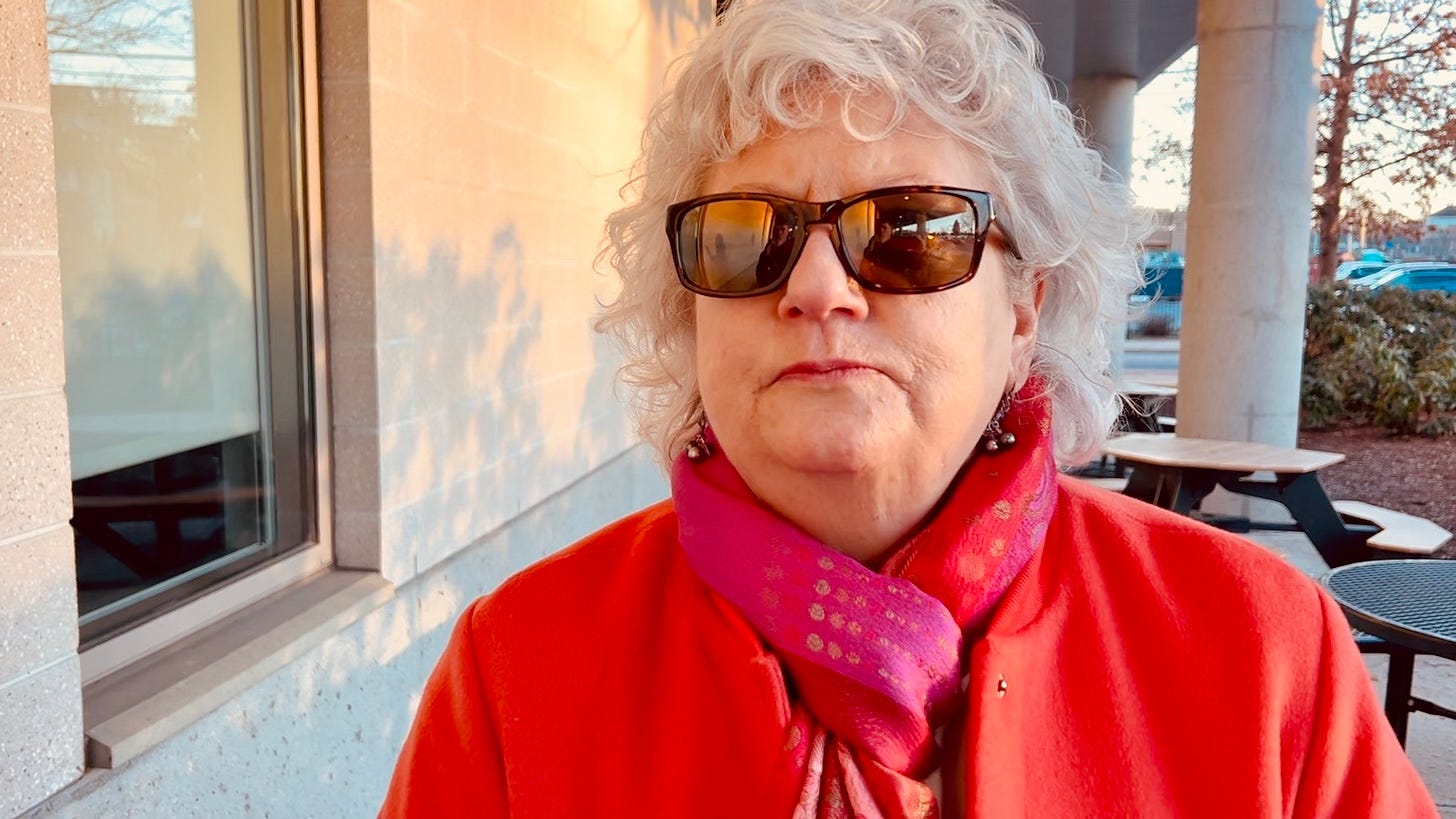Women & Infants caregivers picket over holiday staffing and patient care issues
"If nurses have more patients, they have less time..."
Nancy Chandley Adams: I'm a nurse and a lactation consultant. I've worked at Women and Infants Hospital for 36 years. We have been trying to meet with administrators to discuss the concerns we have about patient care. There is a patient care council that hasn't met in months and it's very difficult for us to try to bring about change or to change what we think needs to be done in the day-to-day care of our patients.
I work on the mother and baby unit and within the past year, they changed our staffing. So AWHON, the group that sets professional standards, says that on a mother-baby unit, nurses should have three mother-baby couplets. That means they have six patients. We are regularly staffing four. That means they have eight patients. Since that has happened, what our lactation team has noticed is that our rate of breastfeeding has gone down dramatically, because you can't rush a newborn trying to learn how to breastfeed. Nurses need to have the time.
If nurses have more patients, they have less time. We're seeing that our population is sicker. People come in with high blood pressure and diabetes, so they require more care from us. And we are not staffing for that. Hospitals are saying there's a nursing shortage. But what we are seeing every day is that the administration is calling nurses off. And by that I mean the administration calls them at home and says, “Don't come in. We don't need you.” They're not utilizing available staff.
The other thing that I've noticed is Women and Infants used to be the place everyone wanted to work. You would meet nurses out and they'd say, “You work at women and infants? I've been trying to get in there for years.”
What we're seeing now is nurses leaving - walking out the door - because the staffing is short and the way the administration is managing it is so difficult. People are experiencing what we call moral injury. We're not able to give the kind of care we want to give to patients. When that happens to you daily, it works on you. They compare the stress of that to having PTSD. You are in a job where you are not able to give the patients what they need. So it's not a good situation.
Steve Ahlquist: When you sour on a job, it's really hard to get back on track.
Nancy Chandley Adams: And there's a nationwide nursing shortage. You would think they'd want to set up an environment that brings people in and makes people want to work in your location - that are happy in their jobs instead of always having them work shorthanded.
Steve Ahlquist: Nursing should be paid for sure, but it's such an important job and I would think that a sense of satisfaction comes from doing such an important job well.
Nancy Chandley Adams: Exactly. You feel like you're making a difference and the patients give you that feedback all the time. But when you're chasing your tail all the time, you lose that satisfaction.
Steve Ahlquist: I can see that, especially with the work you're doing, as a lactation expert. You're bringing together a mother and a newborn in a way that's emotionally important to both. If you can make that connection it's a lot smoother sailing for them than when it doesn't happen.
Nancy Chandley Adams: Exactly. After women give birth, they're happy. But they say to us that now that they came through birth safely and the baby is safe the most important thing they want is to be able to feed their babies. And when they can't, they feel some failure as a mother, and that works on them and can add to postpartum depression.
Steve Ahlquist: And why would you want to stress out a new mother? Or any mother?
Nancy Chandley Adams: As Women and Infants Hospital, shouldn't we be at the forefront?
Steve Ahlquist: It's in the title.
Nancy Chandley Adams: Exactly. Rhode Island has the lowest rate of breastfeeding of all the New England states. Isn't that awful?
Steve Ahlquist: That is awful.
Nancy Chandley Adams: We own that. You know what I mean? There doesn't seem an appetite to improve or change that. It's unfathomable.
Steve Ahlquist: Yeah. It's horrible.
Nancy Chandley Adams: There's good research. There's no doubt about it anymore. When you breastfeed your child, you protect them from many illnesses and you give them lifelong good health. So it's worth the investment in time, energy, and money.
Steve Ahlquist: We're talking about making sure there are enough people on staff to do this job correctly.
Nancy Chandley Adams: Sometimes at night when we have our most inexperienced staff on with no support, there are no managers around. Lactation is not available in the middle of the night. Then nurses can have 10 patients. And we know in the middle of the night, that's when babies wake up. We have this. Why don't we staff for it? It's a shame. We, as a group, are pushing all the time and we're not able to get the administrators behind us to make those changes.
Frontline caregivers at Women and Infants Hospital who are members of SEIU 1199NE held an informational picket on Friday, before the holiday weekend, over management’s refusal to sit down with caregivers to address serious staffing shortages and patient care issues. Holidays at the hospital can present a greater challenge, exacerbating the effects of existing staffing shortages. Over Thanksgiving, union caregivers experienced serious patient care concerns and staffing shortages. Now, with the arrival of Christmas and New Year’s, caregivers repeatedly expressed concern to management about having a staffing coverage plan in place. I spoke with Women and Infants nurse Kelli Price.
Kelli Price: We're out here in the cold weather because our administration, particularly our chief nursing officer, Kim Francis, does not want to meet with us about patient care issues. We have so many patient care and safety issues going on right now, we need to talk with her about them, and she's just refusing to sit with us.
Steve Ahlquist: Why is she not meeting with you all? What is her job?
Kelli Price: She's the chief nursing officer. She's responsible for all the nurses and patient care. She's the one that we need to talk to. We've talked to anybody who will listen to us, but the fact is, she's the one we need to speak with.
Steve Ahlquist: And your contract demands that she does, right?
Kelli Price: Yes. She must speak to us.
Steve Ahlquist: So this is a violation of contract?
Kelli Price: They've been violating our contract a lot lately. This is a serious one because this impacts patient safety.
Steve Ahlquist: So we're out here for today for patient safety over the holidays...
Kelli Price: This is about patient safety in general. We need to meet with her consistently throughout the week, throughout the month, throughout the year. We need to set up a schedule to meet with her and discuss our staffing and patient safety issues. There are broken things to be repaired on the units. There's so much that we need to speak with her about, but she's not willing to and with the holidays coming up, that's a really big problem at the moment. We're looking ahead at our schedules and seeing that there's not enough staff to take care of the patients.
Steve Ahlquist: What happens when there's not enough staff?
Kelli Price: Then you're working short-staffed and you run the risk of making mistakes. You run the risk of not giving patients the care they need.
What we'd like is for them to post open shifts so that we can see who can fill them and offer incentives for people. I mean, let's face it, if you have the day off, you don't want to leave your home and your family on Christmas Eve and go to work. But with an incentive out there people may say, "Okay, you know what? I will do it." I don't know what we're going to do. I'm very nervous about Christmas and New Year’s.
Steve Ahlquist: It seems shortsighted to open the hospital to these kinds of potential problems. Never mind the morality of properly caring for patients - there are financial risks involved here.
Kelli Price: Exactly. I agree. And the hospital has had some issues with patient care where they've ended up having to pay out quite a bit of money. So yeah, it's shortsighted.
We've been here for years. I've been here over 26 years. Many people have been here for 40 or 50 years. We've been through several administrations. We've always had a good working relationship with our administrators. I don't understand this administration. They don't want to sit with us. They don't want to talk with us. They don't want the wealth of our knowledge. Everything they're trying to implement - we've done that before. We can tell you what works and what doesn't work. We can tell you why it doesn't work, what will work, and why it will work.
Steve Ahlquist: You're talking about literally thousands of years of experience on your staff.
Kelli Price: Oh yeah. It used to be that when you came here to work, you stayed here forever. You stayed here 30, 40, or 50 years - until you retired. That's not the case anymore. People are getting very aggravated. We have new employees coming in who are being put in unsafe situations - and they're leaving. We cannot seem to retain new staff anymore. It is so frustrating. That was not the case before and the only thing that's changed is the administration. We haven't changed.
For the last six months, union caregivers have requested the creation of a Patient Care Council as part of their contract to address short and long-term staffing and patient care issues. In response, the employer has refused to allow the process to move forward, attempting to limit which union delegates can be present, a violation of the contract.
“The Patient Care Council, which is part of the current union contract at Women & Infants, is an opportunity for management and staff to work together to tackle staffing shortages and other issues that impact patient care, especially around the holidays. Frontline staff want to be able to give mothers and babies the care and attention they deserve but are working without the staffing and support they need. The urgent change that is truly needed cannot happen until management is ready to listen to frontline staff,” said Jesse Martin, Executive Vice President of SEIU 1199 New England in a statement.
Video1:
At Women and Infants, 1,700 frontline caregivers provide quality care to mothers and newborns as well as a variety of women’s health services. But ongoing staffing shortages, unresolved grievances and arbitrations, and an ongoing lack of clear, respectful communication has created ongoing challenges, culminating in nearly 1,400 Women & Infants caregivers, (95% of workers who participated) voting no confidence in their employer in March.
To the Tune of "White Christmas"
I'm dreaming of a Patient Care Council
Just like the contract says we need
Where the CNO listens
To our staffing concerns
And we solve patient care problems
To the Tune of "Jingle Bells"
Jingle Bells, CNE Smells
Where is the CNO?
Why won't she listen to her workers
And staff the holidays well?
Dashing around the floors
Getting the job done
Everyone is tired and stressed
And still they won't meet with us!
Hey!
To the Tune of "We Wish You a Merry Christmas"
We wish you a well-staffed Christmas
We wish you a well-staffed Christmas!
We wish you a well-staffed Christmas!
And a meeting right now!
Oh bring us the CNO
Oh bring us the CNO
Oh bring us the CNO
So she can hear us!
We won't go until we get it!
We won't go until we get it!
We won't go until we get it!
So schedule it right now!
Good tidings of health
To our patients and friends
Good tidings for Christmas
Which is why we should meet!








an important story for everyone, even if not expecting, since you never know when you will need care from a nurse.
My wife and I are old enough to have been hospitalized a few times and we so value and appreciate the nursing staff that was there for us despite the hard conditions of their job.
I know I'm not the only one who appreciates them - I remember when a GOP Governor of California took on state workers, even teachers, with unfavorable policies for them, he mostly succeeded, but when he took on the nurses the public turned against him, siding with the nurses.
I hope they succeed in improving staffing levels, communications, and getting more respect from the hospital management